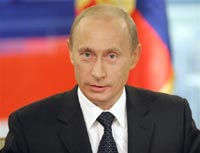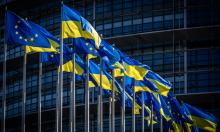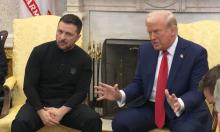Russia's Putin and Australia's Howard sign nuclear trade deal
Russian President Vladimir Putin and Australian Prime Minister John Howard signed the deal during bilateral talks on the sidelines of a summit of Pacific Rim leaders in Sydney.

While the agreement forbids Russia from selling Australian uranium to any other nation or using it for military purposes, critics of the deal worry that it could make it easier for rogue states to obtain the raw material.
Asked whether Russia could be trusted not to sell Australian uranium to Tehran, Putin said his mineral-rich country already had an "excessive" supply of military-grade uranium that it was reprocessing and selling to U.S. power plants.
"If we have a need to sell uranium to other countries, our resources, our own resources, are sufficient," Putin told reporters through a translator.
He said Russia planned to build an extra 30 nuclear power plants over the next two decades and needed Australian uranium to complete the expansion.
Australia has the world's largest reserves of the atomic resource, but has no nuclear power program of its own. Exporting uranium for nuclear power remains a touchy issue among many Australians, who are uneasy about its environmental impact and potential for weapons use.
Critics say the inflow of Australian uranium would allow Russia to divert its own supply of the atomic resource to military or export purposes.
"It may very well be the case that what Russia will do will be to use Australian uranium for domestic purposes," Graeme Gill, a Russia expert at the Sydney University told the Australian Broadcasting Corp. radio. But "what that does is free up Russian sources of uranium, which they can then ship abroad."
Howard has rejected criticism of the Russian uranium deal, saying it is a logical progression from Australia's recent agreement to export atomic fuel to China to feed that country's growing energy needs.
The prime minister also dismissed concerns about Australian atomic fuel falling into Iran's hands, saying that any uranium sold under the deal would be "subject to very strict safeguards."
Russia has built Iran's first nuclear power plant and has a significant financial stake in Iran's nuclear power program.
In recent months, however, Moscow has played a complicated role in attempts to pressure Tehran to comply with global demands that it suspend its budding nuclear weapons program.
Russia and China have blocked attempts by the U.S., Britain and France - the three other permanent Security Council members - to impose harsh U.N. sanctions and have hobbled efforts to move forward on new penalties this summer in the face of continued Iranian refusal to freeze its enrichment activities.
Subscribe to Pravda.Ru Telegram channel, Facebook, RSS!





